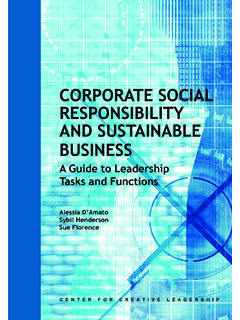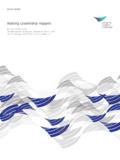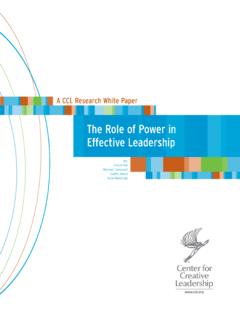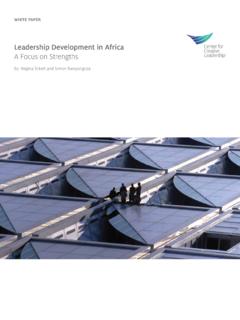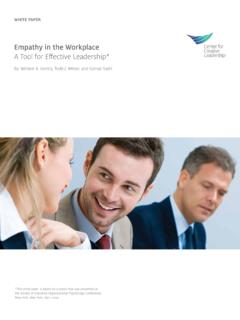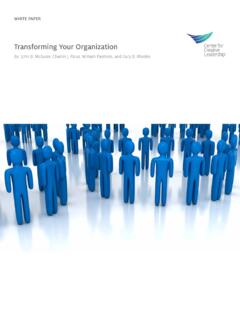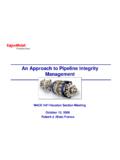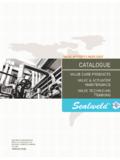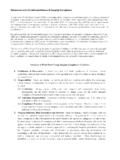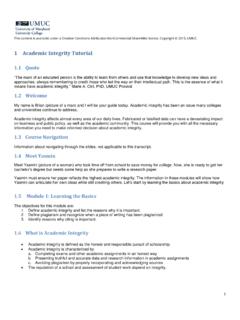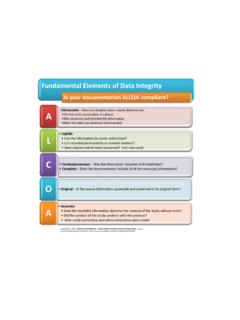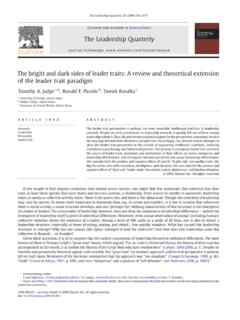Transcription of The Irony of Integrity A Study of the Character Strengths ...
1 WHITE PAPERThe Irony of IntegrityA Study of the Character Strengths of LeadersBy: William A. Gentry, Kristin L. Cullen, and David G. AltmanContentsThe true test of a man s Character is what he does when no one is watching. Attributed to many including John Wooden and H. Jackson Brown, StewartMark HurdJohn EdwardsKen LayBernie MadoffIntroduction 1 Four Character Strengths Leaders Need 3 The Findings 6 What Our Findings Mean 7 The Irony (and Trouble) of Our Findings 9I Have Integrity .. Wait, You Don t Think So? 10 Conclusion 11 The Research 12 Our Samples and Measures 12 Analysis and Results 14 References 16 About the Authors 17 2016 Center for Creative Leadership.
2 All rights reserved. 1 The ethical scandals of business, political, education, and sports leaders often hold a prominent place in newspaper headlines, twitter feeds, blogs, radio broadcasts, television news programs, and talk shows. Think about the ethical failures of leadership over the past couple of decades:Ken Lay and Jeffrey Skilling of Enron Securities and accounting fraud, conspiracyBernie Ebbers of WorldCom Accounting fraud, taking personal loans from companyDennis Kozlowski and Mark Swartz of Tyco Misappropriating corporate funds, tax fraud, tax evasionJohn and Timothy Rigas of Adelphia Communications Fraud and conspiracy, misrepresenting financial resultsDean Buntrock of Waste Management Fraud, falsifying documents, misrepresenting financial resultsGary Winnick of Global Crossing Fraud, accounting irregularitiesSanjay Kumar of Computer Associates Securities fraud, false accounting practicesChung Mong Koo of Hyundai Motor Fraud, embezzlement, allegedly put money away in a fund to bribe officialsMartha Stewart of Martha Stewart Living Omnimedia and James McDermott of Keefe, Bruyette, & Woods Insider tradingSam Waksal of ImClone Insider trading.
3 Securities violations, conspiracy, wire fraudMark Hurd of Hewlett-Packard Inaccurate expense reports and alleged inappropriate relationship with a female contractor Brian Dunn of Best Buy and Gary Friedman of Restoration Hardware Personal misconduct and inappropriate behavior with a female employeeSenator John Edwards Campaign finance law violationJohn Browne of BP Lying under oathDavid Edmondson of Radio Shack Falsified r sum Executives at Lehman Brothers Sub-prime mortgage lending practicesBernie Madoff and Allen Stanford Ponzi schemesOlympus Corporation Tobashi schemesLance Armstrong and many elite cyclists Claimed never to have used performance enhancing drugs with evidence illustrating the contraryJerry Sandusky and other individuals Embroiled in scandal at Pennsylvania State UniversityIntroduction2 2016 Center for Creative Leadership. All rights doubt, this already long list of ethical failings is far from an exhaustive one.
4 Consequently, these highly publicized ethical scandals have challenged people s overall faith in the Integrity and Character of leaders and public figures. Academicians and the popular press both have tried to uncover reasons behind these and other scandals by highlighting the role of Character flaws in organizational or personal failures. Our research takes an alternative approach. We examine the importance of Character Strengths in the performance of leaders in organizations. Specifically, we look at whether the Character Strengths of Integrity , bravery, perspective, and social intelligence matter for the job performance of C-level executives and middle-level population of C-suite executives is obviously important to Study as they are the figureheads of organizations, they set direction for their organizations, and they model normative behavior. Moment by moment, employees carefully monitor the words and nonverbal behaviors of C-suite executives.
5 Social learning theory looms large as workers observe and imitate the actions of these leaders. Executives thoughts about leadership cascade down the ranks and influence the organization s overall ethical climate and the way people act and lead throughout an organization. A leader s Character shapes the culture of his or her organization and also of public opinion about an organization. Middle-level managers are also an important managerial group to Study because they hold important leadership positions in their own right and they are in the pipeline for future positions in the upper echelons of organizations. We are at the end of a difficult generation of business leadership and maybe leadership in general. Tough-mindedness, a good trait, was replaced by meanness and greed, both terrible traits. Jeff Immelt, GE Chairman and CEO 2016 Center for Creative Leadership.
6 All rights reserved. 3 Four Character Strengths Leaders NeedWe focus on the Character Strengths of Integrity , bravery, perspective, and social intelligence because they are important in the selection and development of managers, particularly at the top-levels of organizations (Sosik & Cameron, 2010). These Character Strengths are part of Peterson and Seligman s (2004) Values in Action (VIA) model of Character Strengths and virtues and are defined as positive personal qualities that indicate virtue and human excellence. In what follows, we describe what these Character Strengths are and give reasons why top-level executives and middle-level managers need these Character IntegrityWalk the talk. That is what Integrity really is all about. At the heart of Integrity is being consistent, honest, moral, and trustworthy. Leaders with Integrity are consistent in the face of adversity, show consistency in their words and actions, and are unfailing with who they are and what they stand for (Palanski & Yammarino, 2007).
7 Leaders with Integrity act with authenticity and honesty by speaking the truth, presenting themselves in a genuine way with sincerity, showing no pretense, and taking responsibility for their own feelings and actions (Peterson & Seligman, 2004). Integrity is an important factor in the performance of top-level executives and middle-level managers. Those at the top of organizations are figureheads who should model the organization s values (Hambrick & Mason, 1984). This is important to an organization because C-level executives interact regularly with external stakeholders, develop networks inside and outside their organization, and try to build consensus among multiple stakeholders (Sosik, Juzbasich, & Chun, 2011). Integrity is also important for middle-level managers who must relate well with people in order to build and maintain strong social networks and relationships with others across the organization as well as above and below them in the organizational hierarchy (Huy, 2001).
8 Integrity makes it easier for others to trust a manager, which is likely important as middle-level managers fulfill their duties in networking, consensus-building, and relationship 2016 Center for Creative Leadership. All rights Bravery3. PerspectiveAs the saying goes, it is lonely at the top. Bravery is needed to stand out on your own. Bravery is defined as acting with valor by not shrinking from threat, challenge, difficulty, nor pain; speaking up for what is right even when opposition exists; and acting upon conviction despite facing an unpopular environment (Peterson & Seligman, 2004). Brave executives are more likely to take the lead on unpopular but necessary actions because of their moral courage (Gardner, Avolio, Luthans, May, & Walumbwa, 2005). This is an important Character strength that C-level executives need to do their job effectively. Leaders who are viewed as brave are evaluated as capable of producing long-term sustained success (Kilmann, O Hara, & Strauss, 2010).
9 Middle-level managers need bravery as well. They are stuck in the middle of the organizational hierarchy and frequently face conflict (Huy, 2002; Raes, Heijltjes, Glunk, & Roe, 2011). They need to be brave in the face of linking the vision of upper management to the oftentimes conflicting realities of those below them and their peers around them (Thompson, Purdy, & Summers, 2008).When you are at the top of an organization it is important that you pay attention and focus on the horizon of business opportunities and challenges. Top-level executives need the broadest of business perspectives to understand the Strengths and weaknesses of their competitors (Hambrick & Mason, 1984) and to make decisions that position the organization for long-term success. They also must understand the trends occurring in their industry and other industries that affect them (Geletkanycz & Hambrick, 1997).
10 Perspective allows leaders to incorporate competitor and customer views into a single organizational vision (Finkelstein, Hambrick, & Cannella, 2009). Middle-level managers also need perspective to engage effectively in change and strategy formation. Perspective also facilitates systems thinking, which is part of their role middle-level managers must scan the environment around them in order to generate ideas and plan for the future (Floyd & Wooldridge, 1997; Huy, 2001, 2002; Raes et al., 2011). 2016 Center for Creative Leadership. All rights reserved. 54. Social IntelligenceSocial intelligence is needed at the top and middle of the organizational hierarchy. Social intelligence is the awareness of your and others motives and feelings (you have a sense of what makes you and others tick) and having the agility to adapt your behavior to what the situation dictates (Peterson & Seligman, 2004).

